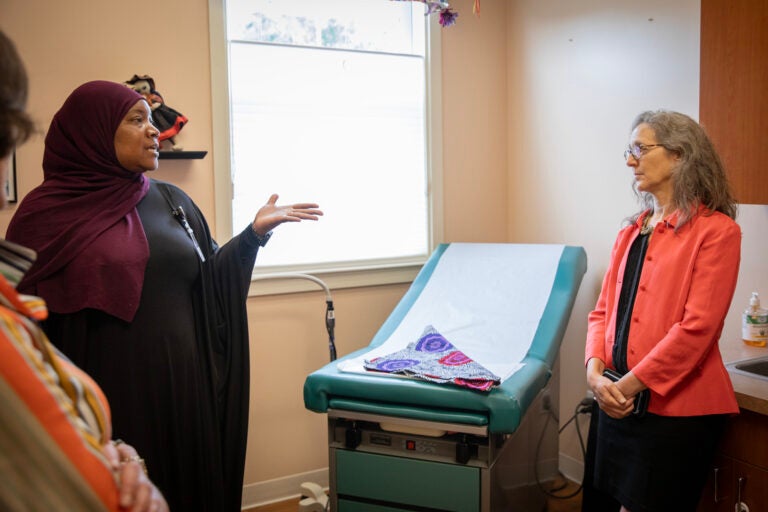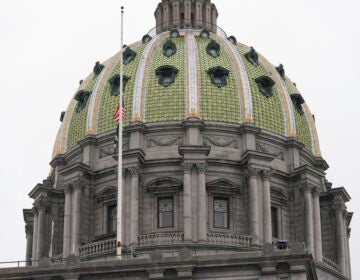‘Momnibus’ bills would expand access to doulas, provide essentials to new parents
Gov. Josh Shapiro and legislative Democrats want Pennsylvania to invest more in maternal health care. Some of their ideas could end up in this year’s budget.

Acting Secretary of Health Dr. Debra Bogen (right) toured Lifecycle WomanCare in Bryn Mawr to meet with representatives from all five of Pennsylvania's stand-alone birthing centers. (Commonwealth Media Services)
This story originally appeared on Spotlight PA.
Pennsylvania’s public health insurance program would cover doula services and new parents would receive kits that include diapers and nursing pads under legislative proposals that could be absorbed into this year’s budget.
The measures are part of a “Momnibus” package championed by state House Democrats’ Black Maternal Health Caucus. It formed in 2023 in response to growing concerns around high maternal mortality rates, which are worse for Black mothers.
Gov. Josh Shapiro has separately pitched an increased investment in maternal health as part of his $48.5 billion spending plan.
The Democrat also wants lawmakers to set aside $3 million in this year’s budget to give public school students free access to tampons and pads, an idea popular with his party that has been met with skepticism by Republican leaders.
Democrats, including those who control the state House, argue new spending on health care initiatives is warranted given the state’s $14 billion surplus. The still-growing reserves were built up through strong tax returns and savings from pandemic-era federal relief. But the Republicans who control the state Senate have mostly rejected calls for new programs this year and instead pitched tax cuts.
Legislative leaders are working to craft a budget deal ahead of the June 30 deadline, and it’s possible some of these initiatives could end up in the final product amid fluid negotiations.
Since May, the state House has passed bills that would expand access to maternal blood pressure monitoring and postpartum depression care. Another bill would enact into statute a state Department of Human Services policy that gives doulas — or nonmedical workers who provide support to pregnant people — a path to seek Medicaid reimbursement.
Some portions of the Momnibus package have been controversial. Private insurers raised concerns about a bill that would reimburse patients for postpartum blood pressure monitors, while a Republican lawmaker said she was approached by medical providers who opposed a bill that would require postpartum depression screening.
State House lawmakers voted unanimously to strip the screening language from the latter bill and made optional a requirement to distribute information about postpartum depression. Other portions of the package, however, have found broad bipartisan support.
The chamber recently voted 123-79 to establish a program that would send new parents baby care items like diapers and onesies, and postpartum essentials including pads and ice packs.
“You shouldn’t have to be lucky to be able to have the things that you need on the first day of your child’s life,” state Rep. La’Tasha Mayes (D., Allegheny), the bill’s sponsor, said at a March news conference.
The federal government started a similar pilot program in 2023 and distributed 3,000 kits in three states with high levels of maternal mortality, infant mortality, and postpartum depression through local hospitals and community groups. The U.S. Department of Health and Human Services is still researching the findings, but survey results from recipients were positive.
Mayes’ bill was opposed by some Republicans, who argued it should be limited to low-income parents and could provide items that an insurer already pays for during hospitalization.
Each postpartum kit would cost the state $75 and each newborn kit would cost $195, according to state Department of Health estimates.
The department says Pennsylvania averaged just under 133,000 births a year from 2018 to 2022. Providing one of each kit per baby at the estimated prices would cost the state just under $36 million annually.
“We will be paying for some of these items twice,” state Rep. Kate Klunk (R., York) argued on the House floor, adding, “This bill does not target the moms who need it the most.”
The state House also took recent action on a priority for Shapiro: putting free period products in public schools. “Girls deserve to have peace of mind so they can focus on learning,” the governor said in his February budget address.
Karla Coffman, a certified school nurse at York Suburban High School, told Spotlight PA that every day she sees students who lack period products or attempt to use something else in their place.
While toilet paper or paper towels may be more accessible, they are unhygienic, Coffman said, and can lead to embarrassment at best or infection at worst.
“You need to calm them down and get them back to learning,” she added.
That’s why she buys a couple of boxes of period products each year to keep on hand. However, the school district considers the expense nonessential, and some community partners — such as a church next door that runs a food pantry for the school’s low-income students — won’t pay for tampons.
The state House voted 117-85 in favor of a bill that would appropriate $3 million for a free period product program.
Periods are “not a dirty thing to talk about. It’s very natural,” state House Speaker Joanna McClinton (D., Philadelphia) told Spotlight PA. “And it’s something that not only we should talk about, but most importantly, we should meet the need because we’re able to do so.”
Most Republican representatives voted against the bill, including state Rep. Stephanie Borowicz (R., Clinton), who said the proposal “is another step by the governor and Democrats to provide everything to you, which leads to communism.”
Immediately after Shapiro’s address, state Senate President Pro Tempore Kim Ward (R., Westmoreland) told the Pittsburgh Post-Gazette that the governor’s proposal was “straight-on, full-fledged, spend, spend, spend,” citing his pitch to put “sanitary napkins in schools” as an example.
Pressed a week later in a TV interview, Ward struck a more conciliatory tone, saying that she wasn’t criticizing the pitch and that it was inexpensive.
“If there’s a need, we’ll do it,” she said, “but I have never, ever had a school come to me and say it’s a need.”
The bills are now in the hands of the Republican-controlled state Senate, which must consent to any new spending and has frequently criticized Democrat’s spending proposals.
With higher-than-expected state revenues, though, some new spending could be on the table.
“Divided government invariably requires a degree of give and take,” state Senate Majority Leader Joe Pittman (R., Indiana) told Spotlight PA last week.
 Spotlight PA is an independent, nonpartisan, and nonprofit newsroom producing investigative and public-service journalism that holds the powerful to account and drives positive change in Pennsylvania.
Spotlight PA is an independent, nonpartisan, and nonprofit newsroom producing investigative and public-service journalism that holds the powerful to account and drives positive change in Pennsylvania.

Get daily updates from WHYY News!
WHYY is your source for fact-based, in-depth journalism and information. As a nonprofit organization, we rely on financial support from readers like you. Please give today.





